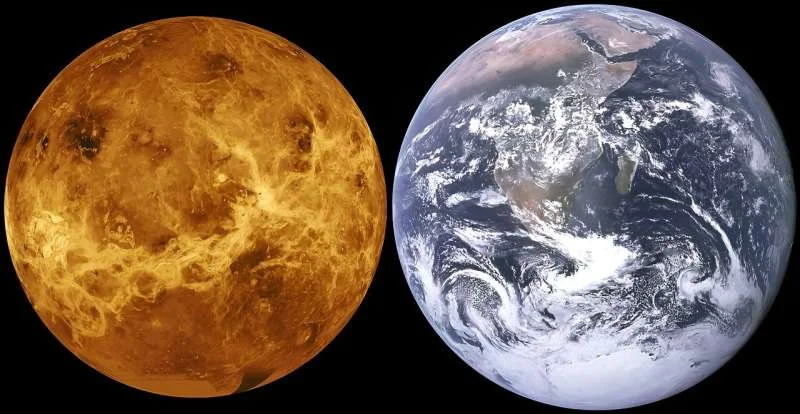Scientists announced whether there is life on Venus
- January 26, 2024
- 0
Venus is only slightly smaller than Earth, so it has had a warm heart for billions of years. But for this planet, sometimes called Earth’s sister, this warmth
Venus is only slightly smaller than Earth, so it has had a warm heart for billions of years. But for this planet, sometimes called Earth’s sister, this warmth

Venus is only slightly smaller than Earth, so it has had a warm heart for billions of years. But for this planet, sometimes called Earth’s sister, this warmth has turned into a betrayal. Today the planet is shrouded in suffocating layers of a toxic atmosphere of carbon dioxide and sulfuric acid. The pressure at the surface is almost 100 times greater than the air pressure at Earth’s sea level. Average temperatures exceed 700°F; This is more than enough to melt lead, and temperatures over 900° have been recorded in the deepest valleys.
If Venus is truly Earth’s sister, then it is distorted. We suspect that Venus, like Mars, once had a thinner, more pleasant atmosphere and a surface filled with oceans of liquid water. The logic here is a little clearer than on Mars, where we can literally see evidence of water with our eyes, but we think both Venus and Earth formed roughly the same way, in roughly the same orbits, with roughly the same material. . So we should have been born with roughly the same amount of water.
As on Earth, much of this water would be chemically bound to rocks, buried deep in the mantle layer. However, some of it may have spilled onto the surface or been carried by numerous water-rich comets shortly after formation, creating a surface source that was also balanced by a thick atmosphere.
The fate of Venus was not her fault, but our insidious sun. As stars age, they become increasingly brighter. Although it may not be noticeable from day to day, it completely changes the character of the star over millions of years. Billions of years ago, our Sun’s habitable zone was being pushed inward from its current location, but as brightness increased, more heat was released and this habitable zone slowly shifted outward over time.
Was there life on Venus? I doubt we’ll ever know, given the unbearable surface temperatures that make exploration nearly impossible. However, it is likely to contain water and a rich atmosphere; the main ingredients were there. However, even if life held on, it did not last long. As our Sun aged, Venus became increasingly hotter. On a hotter planet, more water exists as vapor in the atmosphere than as liquid on the surface.
At first the changes were minor; only the rise in dew point pointed the inexorable path to destruction. But at some point in the past (we’re not sure exactly when) Venus reached a tipping point. Because of so much water vapor, Venus’ atmosphere has become very good at trapping heat radiating from the surface. This radiation could not penetrate the fog and into space, but instead entered the atmosphere and heated it.
What happened next was at least quick. Venus entered a feedback loop, releasing more heat into the atmosphere, causing the oceans to turn into even more steam, which raised the temperature, and so on. First the shallow lakes and streams disappeared, then deeper oceans appeared, until every bit of water was swept away by winds in the atmosphere.
Due to its proximity to the ever-shining sun, water vapor could not last long. The sun’s radiation hit it, breaking its chemical bonds, and oxygen and hydrogen flew away, joining the terrible procession beyond our solar system.
If Venus has plate tectonics as on Earth, the process ended here. With no water to act as a lubricant, heavy, slow grinding resulted in the plates seizing and the shell being locked in place. This constant churning acts as a natural carbon sink: Carbon dioxide binds to rocks sinking deep into the mantle, preventing too much carbon from accumulating in the atmosphere.
But without the cleansing action of plate tectonics, carbon dioxide levels rose to dangerous levels and the ability to absorb radiation from the surface destroyed any hopes of saving the planet. Eventually the atmosphere built up to its current bulging size.
As our Sun grew older, Venus strangled itself.
Venus is not the only one who shares such a fate, as the Sun has not yet reached its final days. It continues to shine, bringing more heat to the solar system every day, and its habitable zone is expanding steadily every year.
At some point, about 500 million years from now, Venus will not be alone, Earth’s oceans will boil, our continents will cease their former motions, and we will eventually become twins with our sister: dead, lifeless, and breathless. have. inflated atmosphere.
Source: Port Altele
As an experienced journalist and author, Mary has been reporting on the latest news and trends for over 5 years. With a passion for uncovering the stories behind the headlines, Mary has earned a reputation as a trusted voice in the world of journalism. Her writing style is insightful, engaging and thought-provoking, as she takes a deep dive into the most pressing issues of our time.